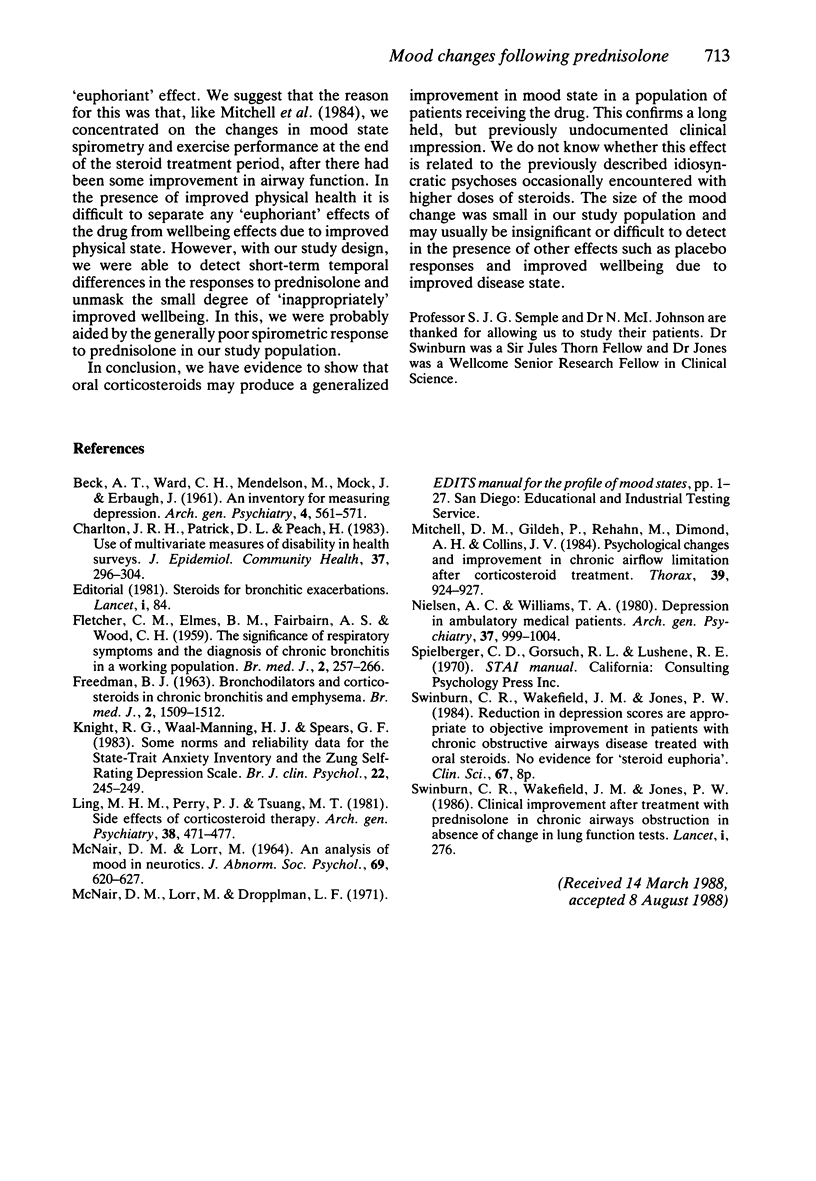Abstract
1. It is a clinical impression that some patients given oral corticosteroids develop a sense of wellbeing that is 'inappropriate' to improvements in physical health. This has been termed steroid 'euphoria', but unlike steroid-induced psychosis it has not been documented. 2. To test for the size and frequency of this phenomenon, 20 patients with severe chronic obstructive airways disease (mean FEV1 0.86 l) were given 30 mg of prednisolone for 14 days, after a period of placebo administration in a single-blind study. 3. Lung spirometry and arterial saturation during exercise were measured serially, together with established measures of mood state. 4. No changes in spirometry or arterial saturation during exercise were detected until 7 days of active therapy. 5. Mood state did not change during the placebo period, but small significant reductions in anxiety and depression were measured after 3 days of prednisolone and before any measurable improvement in lung function. Mood state did not then further improve, despite measurable improvements in lung spirometry. 6. This is evidence that prednisolone may produce a mild 'inappropriate' sense of wellbeing within a population receiving the drug, rather than as an occasional idiosyncratic response.
Full text
PDF




Selected References
These references are in PubMed. This may not be the complete list of references from this article.
- BECK A. T., WARD C. H., MENDELSON M., MOCK J., ERBAUGH J. An inventory for measuring depression. Arch Gen Psychiatry. 1961 Jun;4:561–571. doi: 10.1001/archpsyc.1961.01710120031004. [DOI] [PubMed] [Google Scholar]
- Charlton J. R., Patrick D. L., Peach H. Use of multivariate measures of disability in health surveys. J Epidemiol Community Health. 1983 Dec;37(4):296–304. doi: 10.1136/jech.37.4.296. [DOI] [PMC free article] [PubMed] [Google Scholar]
- FLETCHER C. M., ELMES P. C., FAIRBAIRN A. S., WOOD C. H. The significance of respiratory symptoms and the diagnosis of chronic bronchitis in a working population. Br Med J. 1959 Aug 29;2(5147):257–266. doi: 10.1136/bmj.2.5147.257. [DOI] [PMC free article] [PubMed] [Google Scholar]
- FREEDMAN B. J. BRONCHODILATORS AND CORTICOSTEROIDS IN CHRONIC BRONCHITIS AND EMPHYSEMA. Br Med J. 1963 Dec 14;2(5371):1509–1512. doi: 10.1136/bmj.2.5371.1509. [DOI] [PMC free article] [PubMed] [Google Scholar]
- Knight R. G., Waal-Manning H. J., Spears G. F. Some norms and reliability data for the State--Trait Anxiety Inventory and the Zung Self-Rating Depression scale. Br J Clin Psychol. 1983 Nov;22(Pt 4):245–249. doi: 10.1111/j.2044-8260.1983.tb00610.x. [DOI] [PubMed] [Google Scholar]
- Ling M. H., Perry P. J., Tsuang M. T. Side effects of corticosteroid therapy. Psychiatric aspects. Arch Gen Psychiatry. 1981 Apr;38(4):471–477. doi: 10.1001/archpsyc.1981.01780290105011. [DOI] [PubMed] [Google Scholar]
- MCNAIR D. M., LORR M. AN ANALYSIS OF MOOD IN NEUROTICS. J Abnorm Psychol. 1964 Dec;69:620–627. doi: 10.1037/h0040902. [DOI] [PubMed] [Google Scholar]
- Mitchell D. M., Gildeh P., Rehahn M., Dimond A., Collins J. V. Psychological changes and improvement in chronic airflow limitation after corticosteroid treatment. Thorax. 1984 Dec;39(12):924–927. doi: 10.1136/thx.39.12.924. [DOI] [PMC free article] [PubMed] [Google Scholar]
- Nielsen A. C., 3rd, Williams T. A. Prevalence by Self-report questionnaire and recognition by nonpsychiatric physicians. Arch Gen Psychiatry. 1980 Sep;37(9):999–1004. doi: 10.1001/archpsyc.1980.01780220037003. [DOI] [PubMed] [Google Scholar]
- Swinburn C. R., Wakefield J. M., Jones P. W. Clinical improvement after treatment with prednisolone in chronic airways obstruction in absence of change in lung function tests. Lancet. 1986 Feb 1;1(8475):276–276. doi: 10.1016/s0140-6736(86)90814-7. [DOI] [PubMed] [Google Scholar]


